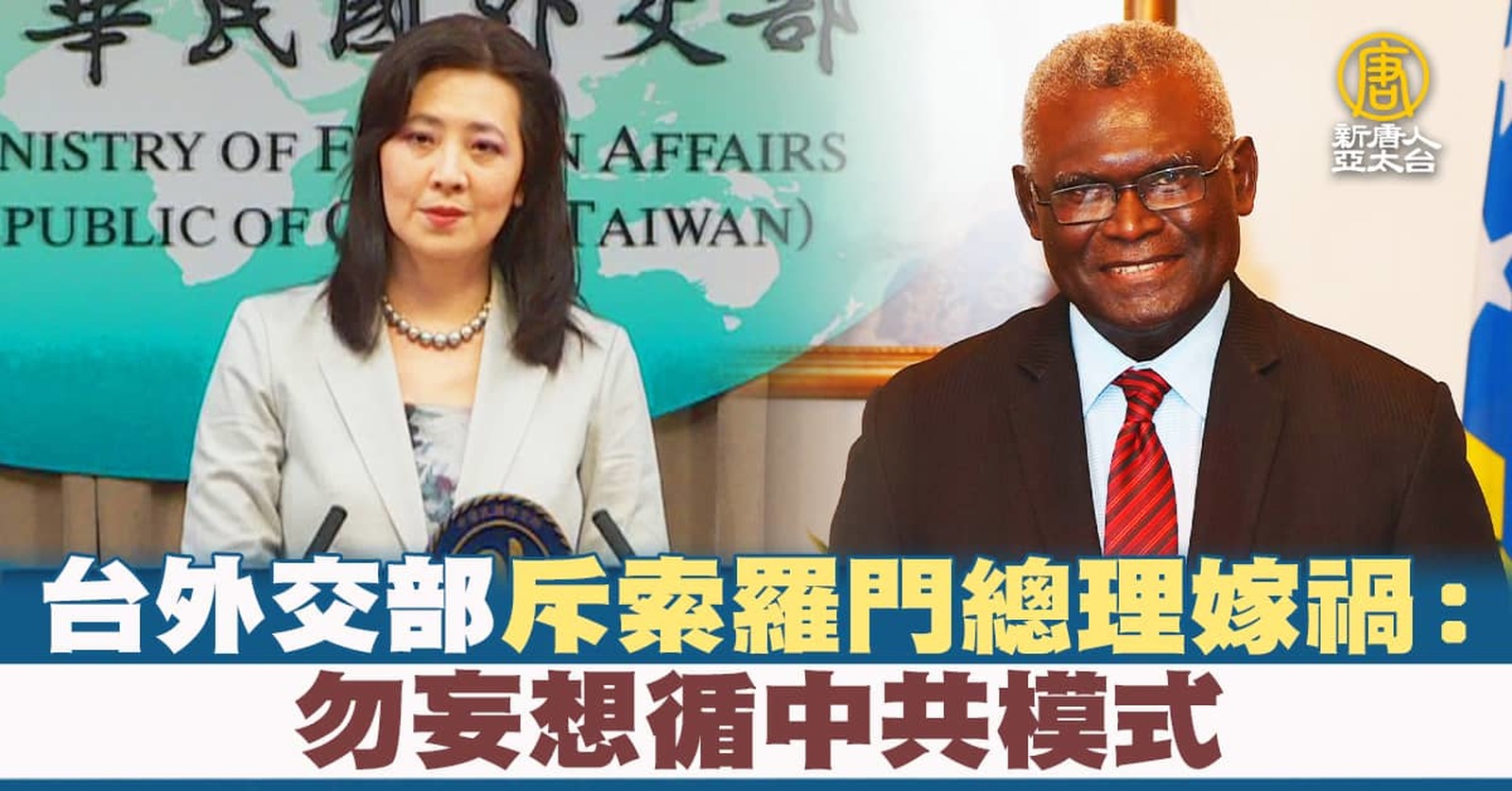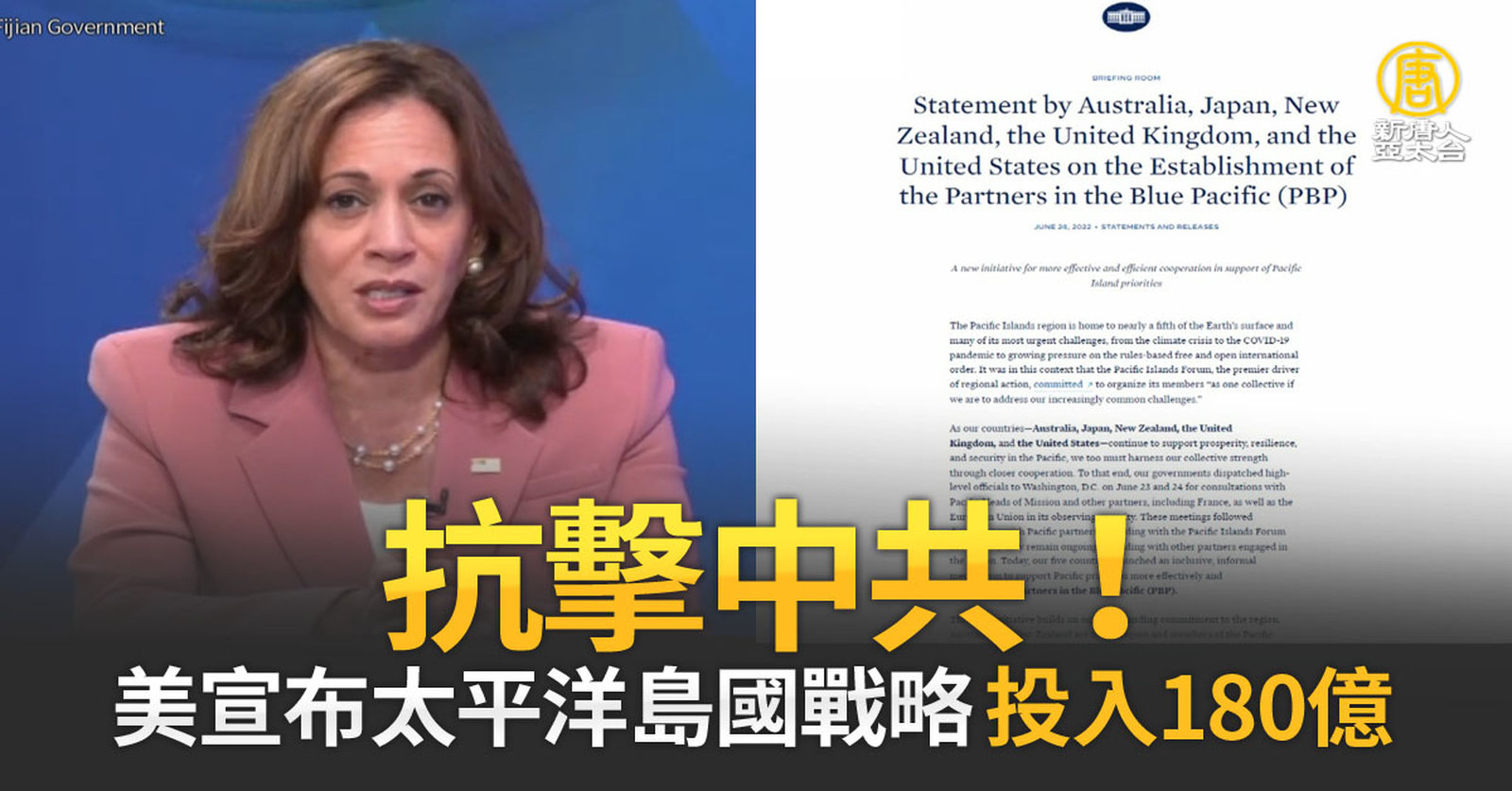台外長:別讓太平洋如南海.遭中共軍事化
【新唐人亞太台張東旭201910月7日報導】台美合辦第一屆太平洋對話,7日在台北登場。中華民國外交部長吳釗燮致詞警告,傳出中共可能在吉里巴斯建雷達站、在索羅門群島建海軍基地。他呼籲民主國家一起行動,別讓太平洋遭到中共軍事化,變成另一個南海。他也憂心「台灣模式」被「中共模式」取代,呼籲各國強力反擊中共對台灣存在的侵蝕,否則區域將充斥腐敗、詐欺、與債務陷阱。
中華民國外交部長吳釗燮致詞指出,太平洋地區天然資源豐沛且具戰略重要性,有越來越多理念相近國家以不同方式協助區域國家達成永續發展及民主治理的目標;「臺灣模式」在太平洋地區的貢獻已成為國際援助的良善典範,但他憂心被「中共模式」取代。
中華民國外交部長 吳釗燮:「我們(台灣)讓(友邦)人民直接獲益,我們太平洋的朋友們稱之『台灣模式』。這是所有援助模式中最好的,即使實際的(援助)金額也許不大。我們也和美國合作,在GCTF全球合作訓練架構下,提供太平洋區域中的官員與專家,齊聚台灣培訓,公共衛生、環境保護、網路安全、人道援助與救災、婦女賦權、媒體識讀等其它重要領域。我很高興,日本和瑞典現在完全參與GCTF,我預期有更多朋友加入我們共同籌辦。我們理念相近,我們也正在做理念相近(朋友)應該做的好事。
然而,這些共享的看法,透過國際合作與協調使得太平洋更好,已受到威權擴張主義的暗流嚴重挑戰。最矚目的例子,是中共9月奪走台灣邦交盟友,索羅門群島與吉里巴斯。
有人說,兩邦交國的轉移,不過又是台灣與中共長期的外交關係競爭;但許多其他人非常關切,中共企圖干預台灣將至的全國性大選;就像中共去年在台灣地方大選所做的。我個人也憂慮,台灣模式的外援,將逐漸被中共模式所取代,中共模式代表著腐敗、詐欺、與債務陷阱。
如果我們看得更深入,我們看到中共的行動是有戰略規劃’,這是它們最讓人擔憂的面向。索羅門群島就在澳洲的門階,我們最重要的朋友及夥伴,就在下方。吉里巴斯占有龐大的水域,在之前中共曾建立現代化太空追蹤站,得以監視美國衛星與飛彈活動。我們已經看到些報導,中共有意在吉里巴斯重開雷達站,並在索羅門群島西部省份建立海軍基地。
從長期戰略觀點來看,理念相近的朋友與夥伴,應真正對此憂慮,太平洋究竟會否維持自由開放?關鍵行為者是否依循以規則為基礎的國際秩序。
最近十年在南海的發展,對我們所有人是一個教訓。當中共開始向大海興建石頭的時候,我們說與做的都不多。我們也曾看到了跑道、雷達、與其他軍事設施,被設置在這些人工島嶼。當時我們接受習近平的話,他向美國承諾,中共無意軍事化南海。
在我看來,不幸的是,現在對我們已經太遲了,要去改變(中共軍事化)在南海的既成事實;中共已經在這裡(南海)駐留,無論自由航行行動(FONOPs)是多麼頻繁。我確切不希望看到,太平洋變成另一個南海,不希望某一天我們看見的是,採許任何行動都已經太遲。
我親愛的朋友們,我們所能做的最好的是,為了防止這情境(成真),區域中所有負責任的利害關係者,理解到台灣在太平洋存在的價值,並強有力反擊中共對台灣存在的侵蝕。」「是時候,我們開始努力一起行動,為那些共同利益。」
開幕式由部長吳釗燮、美國亞太副助卿孫曉雅、美國在台協會AIT處長酈英傑(William Brent Christensen)、馬紹爾駐臺大使艾芮瓊 (Neijon Rema Edwards)分別致詞。其他出席貴賓包括:友邦駐臺使節、理念相近國家駐臺代表、學者專家等。
孫曉雅率領的美國訪團包括美國國際開發總署太平洋及蒙古代表團副處長卡拉漢(Sean Callahan)與美國國務院亞太局台灣協調處副處長戴德年(Daniel Delk)等人。
另外,出席的理念相近國家代表,包括日本代表沼田幹夫、加拿大代表芮喬丹、英國副代表畢騰安、紐西蘭代表涂慕怡(Moira Turley)等。太平洋友邦則有吐瓦魯駐台大使涂莉梅(Limasene Teatu)、諾魯駐台大使凱法斯(Jarden Kephas)和馬紹爾駐台大使艾芮瓊(Neijon Rema Edwards)等3國大使出席與會;帛琉大使據悉不在台灣,未出席。
外交部長英文致詞全文如下(English Version)
Remarks of Foreign Minister Joseph Wu at Pacific Islands Dialogue
October 7, 2019
Deputy Assistant Secretary Oudkirk, Director Christensen, Excellencies Ambassadors and Honorable Representatives, distinguished guests, ladies and gentlemen:
I am honored to jointly launch the first Taiwan-US Pacific Islands Dialogue with Deputy Assistant Secretary Oudkirk.
The Pacific has long been recognized for its abundant resources and strategic importance. It was seen as a body of water separating two continents, and we saw rivals in the Second World War fight bitterly to take control of this vast area. Now we see many like-minded countries working in their own ways to bring sustainable development, democracy and good governance to the countries dotting this huge blue ocean on the map.
In the Pacific Islands Forum, where I participated in August, the US, Australia, Japan, New Zealand, the EU, and more, are all making their own respective efforts. Among the PIF members and partners, I am proud to say that Taiwan stands out as a model of assistance to Pacific Island countries.
We have set up agricultural technical missions that bring food security to local populations. I am sure DAS Oudkirk remembers that the fruits and vegetables provided to the PIF in Tuvalu for the whole duration were from our technical mission. We also provide medical assistance to our allies and beyond. We provide scholarships and job training opportunities to young islanders. We also work with the US in the Pacific Islands Leadership Program that brings future island leaders for exposure in Hawaii and Taiwan. We bring benefits directly to the people, in what our friends in the Pacific call the Taiwan model. This is the best of all possible forms of assistance, even though the actual dollar amount might not be big.
We also work with the US under the Global Cooperation and Training Framework to bring officials and experts from the region to Taiwan for training in public health, environmental protection, cyber security, HA/DR, women’s empowerment, media literacy, and other important areas. I am very pleased that Japan and Sweden are now fully on board the GCTF. I am anticipating more friends joining us as co-organizers. We are the like-minded, and we are doing the good things the like-minded are supposed to be doing.
However, this shared sense of international cooperation and coordination for the betterment of the Pacific has been seriously challenged by the undercurrent of authoritarian expansionism. The most noticeable example of this was China taking away Taiwan’s allies Solomon Islands and Kiribati in September.
Some say the switch is just more of the diplomatic competition that has long existed between Taiwan and China. But many others are very concerned that China is trying to interfere in Taiwan’s upcoming national elections, just as it did last year in our local elections. I personally also worry that the Taiwan model of foreign aid will be gradually replaced by the “China model,” which represents corruption, deception, and debt traps.
If we look deeper, we see that China’s actions were strategically designed, and this is their most worrisome aspect. Solomon Islands are right at the doorstep of Australia, our most important friend and partner down under. And Kiribati occupies an enormous expanse of water, where previously China built a modern space tracking station that can monitor US satellite and missile activities. We have seen reports that China is interested in reopening this radar station in Kiribati, and building a naval base in Western Province of Solomon Islands. From the long-term strategic perspective, like-minded friends and partners should really be worried whether the Pacific will remain free and open, and whether the key actors follow the rules-based international order.
Developments in the South China Sea in the last decade or so serve as a good lesson for all of us. We did not say or do much when China started building tiny rocks into islands. We also saw runways, radar, and other military facilities put on these man-made islands. We then took the word of Xi Jinping when he promised the US that China had no intention of militarizing the South China Sea. It seems to me, unfortunately, that it is already too late for us to change the fait accompli in the South China Sea, and that China is there to stay no matter how frequent the FONOPs are. I certainly don’t want to see the Pacific turned into another South China Sea, with us one day all sighing that it is too late for us to do anything.
My dear friends, the best we can do to prevent that scenario is for all responsible stakeholders in the region to realize the value of Taiwan’s presence in the Pacific, and push back strongly against China’s efforts to erode that presence.
Taiwan, the US and other democratic actors share similar interests in ensuring that the Pacific remains free and open, and that we uphold the existing regional order that has sustained peace and stability over the past decades. It’s time we start working together to act on those interests. And I hope the discussion among the like-minded today can bring us new measures of cooperation for our shared vision of a free and open, stable and prosperous Indo-Pacific.
相關新聞
-

台外交部斥索羅門總理嫁禍:勿妄想循中共模式
2021-12-07 22:32:42索羅門群島首都近期爆發抗爭,要求總理蘇嘉瓦瑞下台。蘇嘉瓦瑞2019年斷交台灣、轉向中共,周一(6日)他在國會不信任案中保住位子,但轉頭就聲稱首都動盪,是受到所謂台灣「代理人」(agents)策動。中華民國外交部(7日)重申,期盼索國人民持續以和平理性,表達意見及對自由民主的支持。
-

台總統指蠻橫無法抹六四 閣揆指5月35日真相將現
2022-06-05 08:08:59六四天安門事件33週年。中華民國總統蔡英文社群平台發文表示,蠻橫手段並無法抹去人們的記憶;當民主受到威脅,世界威權主義也正在擴張,我們更需堅守民主價值,並且和共享民主自由理念的國際夥伴堅定互相扶持。蘇貞昌指出「五月三十五日」在中國,迄今六四仍是當權者要塗抹遮蔽的恥辱記憶,爭取民主的火苗不會被熄滅,在未來的中國,真相會浮現。
-

「硬斷交台灣」衝擊島鏈!索總理背棄國會.對美承諾
2019-09-16 20:56:02索羅門新內閣,今天(16日)召開特別核心會議,趁著多數挺台灣的國會休會,企圖提前1個月拍板是否轉向中共。中華民國外交次長徐斯儉,今天抵達索國。美國副總統彭斯已打電話給索國總理約見面勸阻。美國、澳洲動作頻頻,台灣立委分析,民主陣營,正防止中共進入戰略要地。但索國總理,今天傍晚,背棄對國會、對美國盟邦的承諾,在國會聽證會報告尚未出爐前,就做出跟台灣斷交決定。
-

中共國企租島75年 索羅門政府:合約違法
2019-10-25 20:21:24再來看到,中共滲透太平洋島國,從台灣手上挖走索羅門群島後,中共國有企業森田集團(China Sam)與索羅門群島中央省(Central Province)簽約,租下整座杜拉吉島(Tulagi),租期長達75年,引發爭議。索國司法部長穆利亞(John Muria)25日宣布,該協議沒有和中央政府協商,也缺乏執行細節,是非法的、有損國家政府權力,必須立刻終止。這項合約,在索羅門9月跟台灣斷交後才曝光;杜拉吉島位置重要,是索國以前的首都,二戰期間是美軍基地。
-

索國驅逐台大使?台美澳民主陣營因應中共進逼
2019-09-16 15:09:04索羅門「島嶼太陽報」(Island Sun)今(16日)引用匿名消息報導稱,索國政府準備驅逐(expel)中華民國大使,藉口是大使廖文哲干預索國內政。索國今天將召開特別核心會議,決定是否轉向中共。中華民國外交次長徐斯儉,今天抵達索國商討。立委說,台灣跟美國、澳洲民主陣營,正回應中共步步進逼。外交部(16日)表示,目前沒有任何跡象顯示索國政府打算驅逐大使。
-

【全文】美台首政府對話 美副助卿:代表川普.蓬佩奧啟動
2019-10-07 22:56:00中華民國與美國今天(7日)舉辦第一屆「太平洋對話」,美國亞太副助卿孫曉雅率團來台灣參加,她表示是代表川普與國務卿前來啟動,討論在太平洋區域的合作發展。這是台美首度正式政府間對話。外長吳釗燮稍早表示,美方對中共奪取台灣邦交的反應強烈,吳釗燮致詞警告,太平洋可能變下一個南海。
-

南太第三大.八成民意挺台 索羅門卻斷36年邦誼
2019-09-16 20:50:01索羅門群島民調超過八成支持台灣邦交。但新政府黨團與內閣今天(16日)傍晚決議,轉向中共。索國是南太平洋地區第三大島國,是中華民國在太平洋面積最大、人口最多的邦交國。戰略地位重要,二次大戰,是盟軍重要反攻點。從1983年建交後,台灣在索國2000年動盪期間也不離不棄,索國人民高度正面評價台灣長期的援助支持。新政府的斷交決定,點燃民間怒火。中華民國友邦總數,將降到16個,太平洋友邦剩5個,包括諾魯、吐瓦魯、帛琉、吉里巴斯與馬紹爾。
-

挖索國報復台灣? 立委:中共在港自逼牆角
2019-09-03 10:26:37路透社(2日)報導,索羅門群島已組成一支部長級元首小組和北京會談,最快可能在本周和中共建交。學者范世平認為,中共是為了報復台灣購買F16V新戰機。立法委員羅致政(2日)受訪表示,中共這次作法,跟香港局勢有關。
-

民主對上中共 台索斷交或促美澳日歐合作?
2019-09-18 10:48:39午報頭條先來關心,中共砸錢收買,挖走南太平洋戰略要地、中華民國邦交國索羅門群島,衝擊民主第二島鏈。美國超過十位軍事外交領域的國會議員表態關切。參議院外委會主席里施表示,周三聽證會,將向亞太助理國務卿質詢。重量級參議員,考慮終止對索羅門援助,呼籲國際反制中共霸凌,制定台北法案。日本則罕見發聲明。此外,這次邦交戰,美方高層與澳洲協助,歐盟國家也有角色;未來是否形成美、澳、日、歐合作,一股穩定區域新力量,值得關注。
-

中共挖兩邦交 明居正:分心美國.擾台大選兩面刃
2019-09-21 01:37:42中共十一前夕內外交困,將召開四中全會,傳出習近平面臨黨內挑戰,因此對台灣下手。最近一週挖走中華民國南太平洋兩個小邦交國。台大名譽教授明居正(20日)分析,中共藉此轉移焦點,也干預台灣大選。熟悉太平洋的學者楊聰榮認為,這對美國影響很大,但南太平洋後續局勢還很難說。請看我們今天的透視焦點。
-

索羅門77國慶 美國務卿賀詞點名「台灣」.自由印太
2019-07-07 12:25:33中華民國在南太平洋的邦交國索羅門群島,被中共積極挖牆腳。7月7日索羅門群島國慶,美國國務卿蓬佩奧賀詞點名台灣。
-

台索斷交 總統譴責中共破壞國際秩序 日網友挺台
2019-09-17 09:07:38再來關心,索羅門群島新政府,違背民意、背棄對國會跟美國盟友的承諾,昨天(16日)傍晚決議轉向中共。中華民國總統蔡英文晚間譴責中共,強調不會屈服,台灣必須團結走向世界,沒有退路,一致對外走出自己的路。總統還在推特上用英文日文,向國際社會聲明「台灣人永遠不會接受中共的一國兩制」,大量日本網友留言挺台。
-

美高層關切索國:台不被孤立 對區域穩定重要
2019-09-12 14:59:35好,中共除了抓捕中華民國公民,還持續利誘中華民國友邦;9日澳洲路透社報導,台灣邦交國「索羅門群島」派出工作小組前往中國大陸,評估外交轉向的考量,引起各界揣測台索是否將斷交。11日,美國國防部印太事務首席副助理部長海大衛表示,台灣能維持外交夥伴,確保不被孤立,對台灣與區域和平的穩定都相當重要。[美國駐索國大使艾伯特格雷,昨天對也索國總理蘇嘉瓦瑞表示,美國支持索國與台灣的良好關係,也提到索國與中共建交可能面臨的挑戰。艾伯特格雷 說,台灣是索國的「絕佳夥伴」。。
-

中共染指南太 江峰:台灣安全提升 外交佳機
2019-09-23 20:43:22中華民國在南太平洋連失兩個友邦。中國時事評論員江峰認為,這反而讓台灣得利,因為中共企圖走向第二、三島鏈,美國勢必強化防守第一島鏈包括台灣;而且凸顯台灣跟中共的不同,台灣將會在國際地位上被賦予更重要角色。
-

索羅門自媒體街訪 逾八成挺台灣邦交
2019-07-09 07:03:32中共積極挖台灣牆腳,索羅門群島新政府派出考察團,在考慮邦交。七月七日國慶前夕,當地自媒體(UMI NAO)(6日)發布影片,在首都街頭,訪問民眾的意願。
-

索國人抗議轉向中共「出賣人民」馬省人喊獨立
2019-09-18 10:44:16索國門群島內閣16日決定轉向承認中共。人口最多的馬省,民眾今天(17日)上午在首府奧基和平遊行抗議,質疑當局為了錢、不管民意。許多索國民眾在網路上抗議當局。中華民國大使館中午降下國旗,許多民眾前往致敬感謝台灣貢獻。
-

台索斷交 蔡總統:譴責中共破壞國際秩序
2019-09-16 21:28:30火線新聞,馬上帶您看到,索羅門群島新政府,違背民意、背棄對國會跟美國盟友的承諾,今天(16日)傍晚決議轉向中共。中華民國總統蔡英文晚間譴責中共,強調不會屈服,台灣必須團結走向世界,沒有退路,一致對外走出自己的路。
-

中共挖台索邦交 美高官批脅迫.美復設使館
2019-09-12 20:42:45台灣與索羅門邦交狀況出現危機,索羅門總理在11日表示「台灣對索國毫無用處」,對此,外交部今天(12日)在記者會表示,仍密切與索國溝通中,而美國的外交與國防官員都大動作支持台索關係,也引起關注。
-

抗擊中共!美宣布太平洋島國戰略 投入180億台幣
2022-07-13 15:04:24歡迎回來,太平洋島國論壇12日登場,美、中競爭讓今年的論壇備受關注。吉里巴斯日前突然宣布退出論壇,被外界視為受到中共影響。美國副總統賀錦麗今天透過視訊在會上發表演說,宣布美國將在東加、吉里巴斯開設新的大使館,以及一系列美國在太平洋島國的新舉措,包括未來10年將在這個地區投入6億美元,約新台幣180億元的資金。
-

索總理稱「臺灣無用」? 台外交部:索國絕大多數民意認同台灣
2019-09-12 01:58:10《澳洲人報》今( 11 )日以「太平洋島國將與台灣斷交」為題報導,稱索羅門群島總理梅納西·蘇嘉瓦瑞( Manasseh Sogavare )曾提及「台灣對我國完全沒有用處」,甚至暗示中國大陸或許會是更好的外交夥伴,因為能與澳洲抗衡。中華民國外交部表示,「相信索國絕大多數民眾及政治人物均能認同,與臺灣維持邦誼才是最符合索國及區域各國長期利益的正確決定。」
































